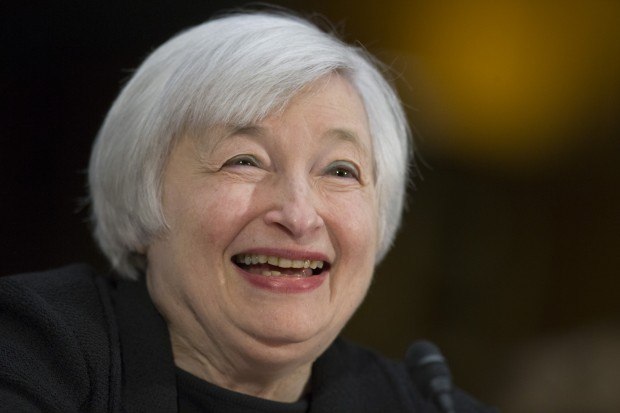Federal Reserve Chair Janet Yellen, in response to a warning from a U.S. congressman to halt global regulatory talks in the early stages of Donald Trump’s presidency, said in a letter the Fed has the authority and responsibility to consult with its foreign counterparts and does so to benefit the United States.
The pointed letter to Republican Representative Patrick McHenry, reviewed by Reuters, suggested the U.S. central bank will carry on as usual with international discussions on financial standards even while Trump and conservatives in Congress move to ease U.S. bank rules adopted after the 2007-2009 financial crisis.
“We will continue to coordinate with the Treasury Department, which is itself a member of several international forums related to financial services, such as theFinancial Stability Board (FSB) and the International Association of Insurance Supervisors, as well as with the other U.S. supervisory agencies that participate in various international forums,” Yellen wrote in a Feb. 10 letter to McHenry, who is vice chairman of the House Financial Services Committee.
“In exercising our longstanding authorities and responsibilities for consulting with our foreign counterparts, we share the objective that the whole U.S. government must work constructively to ensure a strong, stable U.S. economy and financial system,” she added.
A clash over the Fed’s authority to engage in global talks on capital standards, for example, could antagonize the U.S. central bank’s already testy relationship with Republicans who have criticized its efforts to bulk up financial regulations and keep interest rates low since the crisis and recession.
Yellen on Tuesday began two days of congressional testimony, her first since Republicans took control of the White House and both houses of the legislature. She faces a Senate panel on Tuesday and the House panel on Wednesday, when McHenry could again question the Fed’s participation in global forums.
In an unusual Jan. 31 letter to Yellen, the congressman from North Carolina said the Fed “must cease all attempts to negotiate binding standards burdening American business until President Trump has had an opportunity to nominate and appoint officials that prioritize America’s best interests.”
The Fed operates independently from Congress and the White House even while lawmakers oversee it. Fed officials such as Governor Daniel Tarullo, who announced last week he would retire in April, often participate in forums including theBasel Committee on Banking Supervision and the FSB.
While Trump and other Republicans have set out to repeal many post-crisis reforms meant to rein in risk-taking by big banks and other firms, Fed policymakers and many Democrats have warned about going too far.
Yellen noted in the letter that standards recommended by international bodies are not binding unless they are adopted by U.S. authorities acting under U.S. law, often after a public comment period. The Fed has at times adopted different domestic standards than those discussed globally, she added.
“Strong regulatory standards enhance the stability of the U.S. financial system,” she wrote. “By participating in the development of international regulatory standards, the Federal Reserve can influence the standards in ways that promote the financial stability of the United States and the competitiveness of U.S. firms.”





















 Nearly 26.2M Workers Are Expected to Miss Work on Super Bowl Monday
Nearly 26.2M Workers Are Expected to Miss Work on Super Bowl Monday  Allianz Built an AI Agent to Train Claims Professionals in Virtual Reality
Allianz Built an AI Agent to Train Claims Professionals in Virtual Reality  Execs, Risk Experts on Edge: Geopolitical Risks Top ‘Turbulent’ Outlook
Execs, Risk Experts on Edge: Geopolitical Risks Top ‘Turbulent’ Outlook  AIG, Chubb Can’t Use ‘Bump-Up’ Provision in D&O Policy to Avoid Coverage
AIG, Chubb Can’t Use ‘Bump-Up’ Provision in D&O Policy to Avoid Coverage 









